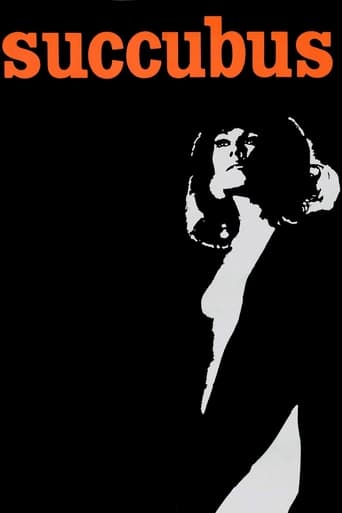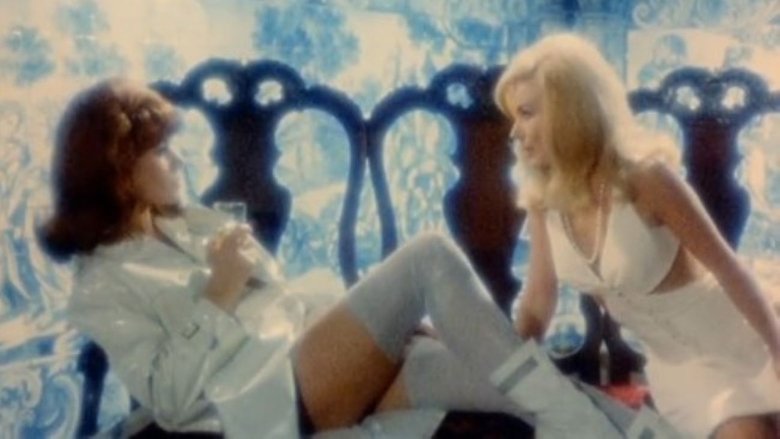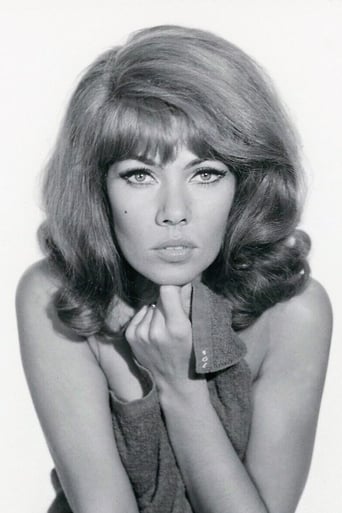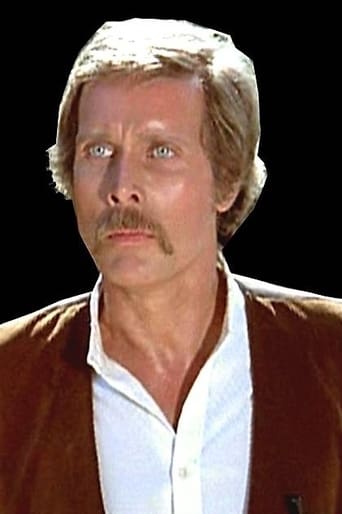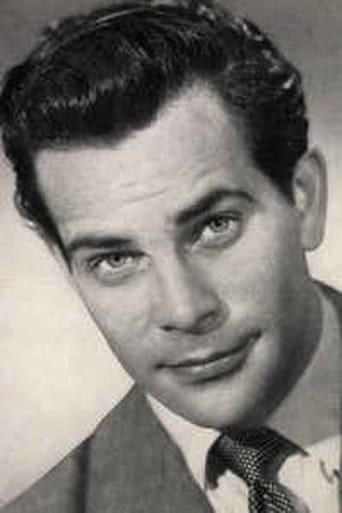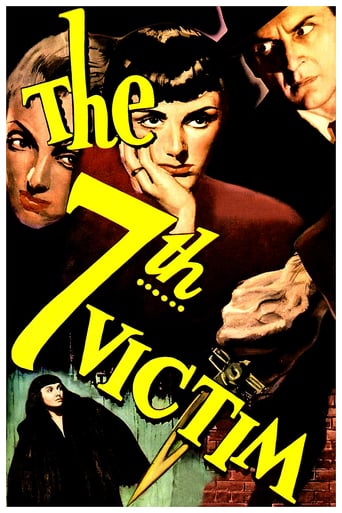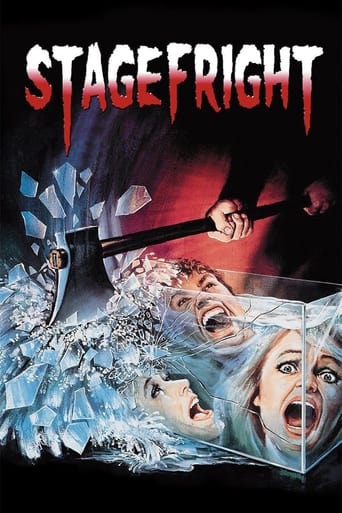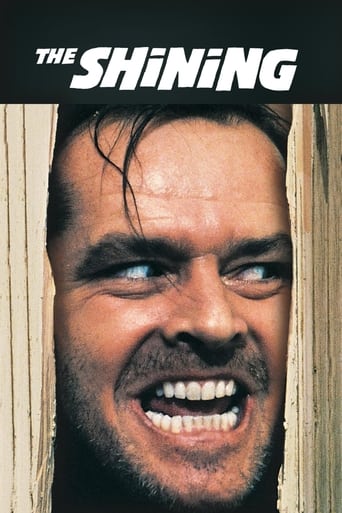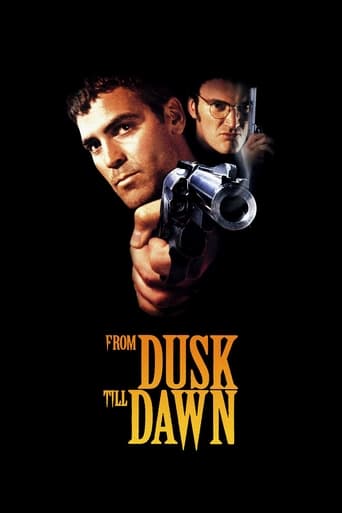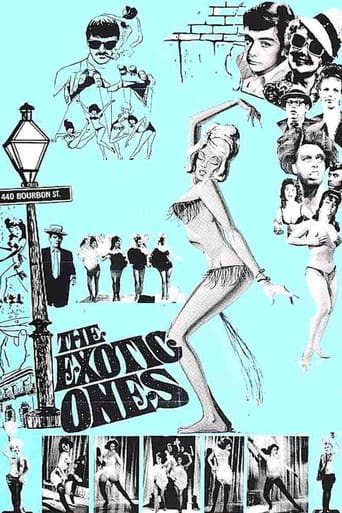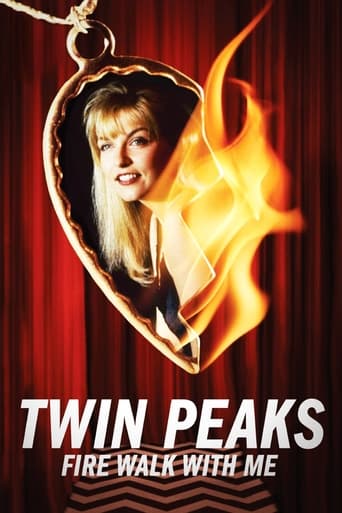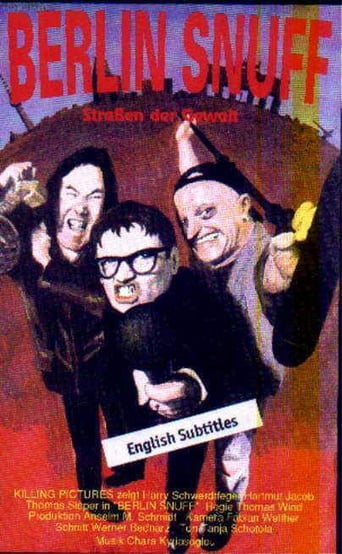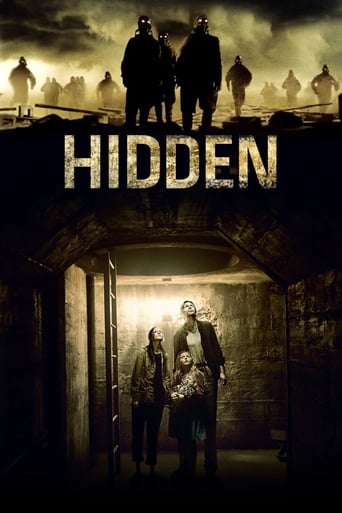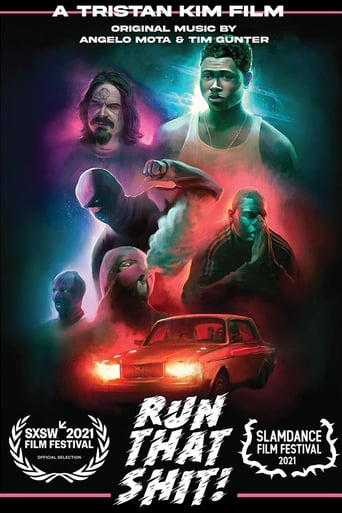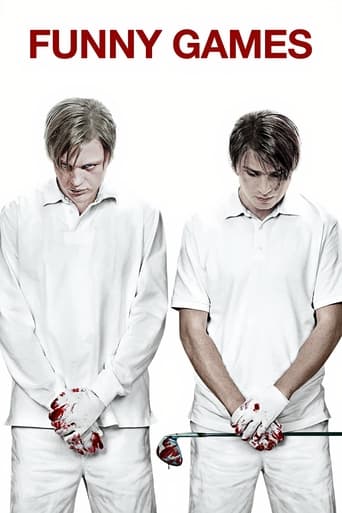Succubus (1968)
Janine Reynaud stars as a nightclub stripper who free-floats through a spectral 60's landscape littered with dream-figures, dancing midgets and bizarre S&M games.
Watch Trailer
Cast


Similar titles
Reviews
Very well executed
Must See Movie...
Boring
This is one of the best movies I’ve seen in a very long time. You have to go and see this on the big screen.
"Succubus" has Janine Reynaud as Lorna, a nightclub performer whose sadomasochistic live shows attract a plethora of wealthy onlookers. Though her shows are a success, Lorna begins to lose her grip on reality, fading in and out of a dreamlike marathon of bizarre encounters, images, and even murders.As with virtually all Jess Franco films, "Succubus" suffers a serious incoherence issue— the editing is at times sloppy, the pacing is languorous and sometimes un-involving, and the central premise and exposition are all but essentially forgotten within the first ten minutes. The opening scene is clear and captivating, but the audience loses any and all potential grip immediately after— such is Jess Franco. With a plot that is either intrinsically unintelligible, or perhaps ingeniously molded to mirror the schizophrenic mind, the film instead offers visuals a plenty.Sexually-charged, gaudy, and thoroughly dazzling are the aesthetics here, from the seediness of the nightclubs to the various sets and scenarios which Lorna is immersed in; there is a consistent visual flair that Franco employs which guarantees audience attention just on a surface level. The hallucinogenic nature of the film is reminiscent of adventures down the rabbit hole, albeit a bit more macabre and ten times as sexual. The stringing together of waking reality or waking fantasy is powerful on a subconscious level, as each of the images provoke without relent.It's not difficult to see why some people can't stand the film, or Jess Franco, but there's something unusually captivating about "Succubus". Not being the biggest Franco fan, I did stumble through the film at times and I did find it dull in more than one instance, but it is a thoroughly bizarre amalgam of images and mindsets inhabited by a murderous nightclub S&M stripper/performance artist, and there's something inherently fascinating about that whether you like it or not. Even if you wanted to be bored, it's kind of hard to be. Confused? That's understandable. 6/10.
Lorna Green(Janine Reynaud)is a performance artist for wealthy intellectuals at a local club. She falls prey to her fantasies as the promise of romantic interludes turn into murder as she kills those who believe that sex is on the horizon. It's quite possible that, through a form of hypnotic suggestion, someone(..a possible task master pulling her strings like a puppet)is guiding Lorna into killing those she comes across in secluded places just when it appears that love-making is about to begin. After the murders within her fantasies are committed, Lorna awakens bewildered, often clueless as to if what she was privy to within her dreams ever took place in reality.If someone asked me how to describe this particular work from Franco, I'd say it's elegant & difficult. By now, you've probably read other user comments befuddled by what this film is about, since a large portion of it takes place within the surreal atmosphere of a dream. Franco mentioned in an interview that he was heavily influenced by Godard early in his career, as far as film-making style, and so deciding to abandon a clear narrative structure in favor of trying to create a whole different type of viewing experience. And, as you read from the reaction of the user comments here..some like this decision, others find the style labouring, dull, and bewildering. I'll be the first to admit that the film is over my head, but even Franco himself, when quizzed by critics who watched "Succubus", admitted that he didn't even understand the film and he directed it! Some might say that "Succubus" was merely a precursor to his more admired work, "Venus in Furs", considered his masterwork by Franco-faithful, because it also adopts the surreal, dreamlike structure where the protagonist doesn't truly know whether he/she is experiencing something real or imagined. In a sense, like the protagonist, we are experiencing the same type of confusion..certainly, "Succubus" is unconventional film-making where we aren't given the keys to what is exactly going on. And, a great deal of the elusive dialogue doesn't help matters. "Succubus" is also populated by beatnik types and "poet-speak", Corman's film, "A Bucket of Blood" poked fun at. My personal favorite scene teases at a possible lesbian interlude between Lorna and a woman she meets at a posh party..quite a bizarre fantasy sequence where mannequins are used rather unusually. Great locations and jazz score..I liked this film myself, although I can understand why it does receive a negative reaction. Loved that one scene at the posh party with Lorna, a wee bit drunk, writhing on the floor in a gorgeous evening gown as others attending the shindig(..equally wasted)rush her in an embrace of kisses.
This was an early color film for Franco but he seems to have mastered the new process with relatively little problems, here utilizing a decidedly Bava-esque palette (the famous scene with the mannequins, for instance). SUCCUBUS is considered a transitional film for Franco because, from here on in, the emphasis on eroticism will become much more pronounced until it almost turns into pornography sometime during the next decade. I haven't watched any films from the latter category but this film certainly pushes the issue as far as it was permissible at the time! Here, too, because of its dream-like nature (as was also to prove the case later with A VIRGIN AMONG THE LIVING DEAD [1971]) the film's narrative lapses and general 'incoherence' are easier to accept than in, say, EUGENIE DE SADE (1970) where one does not really expect to find such liberties though I am beginning to realize that, with Franco, virtually anything goes!Even though he does not receive credit for writing the screenplay, it is hard to imagine that Franco had no hand in its actual conception, as the themes the film explores are certainly in keeping with the rest of his oeuvre (right from the very first scene, the sleazy nightclub act, which reappears over and over in his films). While the plot is not easy to follow (it actually pays to read about it beforehand, because otherwise it would be practically impossible to make head or tails of anything!), it copiously references noted figures from the various arts paintings, literature, cinema, music which apparently pre-occupied Franco during this period. Unfortunately, most of it is probably beyond the reach of most audiences (myself included) but I must say that I was very pleased to learn that Franco, through a line spoken in the film by Janine Reynaud, held Bunuel, Lang and Godard as the epitome of cinema three film-makers whose work is unmistakably linked (Bunuel chose film as his creative métier after watching Lang's DESTINY [1921]; Lang appears as himself in Godard's CONTEMPT [1963]) and all of whom clearly influenced Franco in the initial phases of his career. In particular, there is a brief repeated scene where Michel Lemoine, looking straight at the camera, describes Reynaud as 'a devil on earth' which reminded me of a similar 'gimmick' used by Bunuel in THE EXTERMINATING ANGEL (1962).The film has some very striking imagery (not least of all, the two S&M scenes that were pretty much taboo at this point) with the soft-focus and often sensual dream sequences being particular highlights; another key scene finds Reynaud and Jack Taylor going up to her castle and he recounts the tale of Faustine, a Succubus, to her. But, even in this shortened version of the film, one still has to contend with banal passages like the drugged costume party sequence and other moments where the pace drops. Also, I have a quibble regarding the film's latter stages: why did Jack Taylor all of a sudden want to do away with the Janine Reynaud character (the irony of his unconsciously 'hiring' the Devil himself to do this is interesting but it remains frustratingly unexplained).The music, as is customary for a Franco film, provides the perfect counterpoint to the onslaught of visual and narrative ideas; special care is also taken with the sound effects which are meant to illustrate Janine Reynaud's disorientation (and, with her, the viewer's). The casting of the main roles is appropriate as well: Reynaud may not rank among Franco's loveliest leading ladies but it is arguable whether anyone could have essayed the part with more conviction and, in any case, her sensual body is certainly utilized to the hilt throughout; Jack Taylor is commanding enough as her shady manager/lover; Michel Lemoine makes for a mysterious and sinister Mephistophelean figure; Howard Vernon's brief appearance is a natural, and typically professional.Obviously, I would love to see the original full-length German-language version of the film released as a SE DVD, but one wonders whether that will ever come to pass. At least, my VHS copy was a one-up on the now-OOP R1 Anchor Bay DVD, as the film was presented in its correct (I assume) widescreen ratio! The film's silly pan-and-scan theatrical trailer (for the U.S. version) was also included.
I haven't seen all of Jess Franco's movies, I have seen 5, I think, and there are more than 180 of them. So maybe it's a bit early to say so but "Necronomicon Geträumte Sünden" (better known as 'Succubus', but that is the cut version) is according to me if not the best, certainly on of Franco's best. Franco is best known (although 'known' might be slightly exaggerated) for "Vampiros Lesbos", a weird cultish movie that got more acclaim in the mid 90's when people found out Jess Franco was also an interesting composer. Through the soundtrack a happy few discovered the man and found out what was to be expected after seeing the video clip of 'The lion and the cucumber' ('Vampyros Lesbos OST'): Jess Franco is an overwhelming director. When the phone rang during 'Vampiros', I let it ring. I just wanted to see more of the movie. Since that moment Franco never could grip me that much. But then I stumbled on this movie. It is even better than "Vampiros Lesbos", I think. Franco is looking for what he can do with a story and a camera. We find out he can do a lot. I certainly didn't expect to find "Necronomicon" that great: its beginning didn't impress me at all. Remember, I had seen "Vampiros Lesbos" before (although chronologically that came only three years later) and both movies kinda start the same. But then the story went on, puzzling and gripping, beautiful camera work and the stuff you would like to see Godard do if he weren't so occupied with spreading his political messages. Later on in the movie I heard a dialogue about which art was or wasn't old-fashioned. The man says that all movies have to be old-fashioned because it takes weeks before the audience sees what got filmed. But the girl replies that "Bunuel, Fritz Lang and Godard yesterday made movies for tomorrow". Janine Reynaud is an interesting lead actress and of course Howard Vernon, a Franco regular, is also there. Luckily the acting is good (something that can spoil a lot of Franco movies for you, but not this one). But certainly watch out for the dummy scene. The erotic tension, the wild directing and the fact that it's a yesterday's movie for tomorrow make it a movie a lot of people should see. The fact that it is a bit more accessible than "Vampiros Lesbos" certainly helps.

